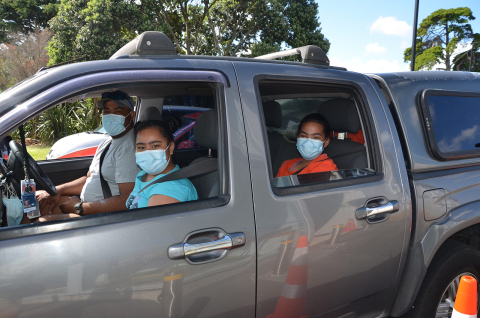COVID-19 is in the community. To slow the spread and continue to protect yourself, your whānau, and your community, it is important to keep up the healthy habits we know.
Everyone in in Aotearoa New Zealand aged 5 and over can get their free COVID-19 vaccination now. You can get a booster if it has been at least 3 months since your second dose.
Vaccination remains one of the best tools in the fight against COVID-19. Even if you have had COVID-19, getting a booster once enough time has passed gives you another a layer of protection from the virus.
Being up-to-date with your COVID-19 vaccinations also helps protect people who are more at risk of becoming seriously ill from the virus and people who cannot be vaccinated such as babies and children under 5 years old.

If you have cold, flu or COVID-19 symptoms you should get a test as soon as you start to feel unwell. Doing a test and reporting the result in My Covid Record means you can get the help you need as early as possible.
Call your doctor or Healthline on 0800 358 5453 for advice about getting tested.
Face masks can help reduce the spread of COVID-19. They are useful in poorly ventilated indoor areas and when you are around people you do not know.
They stop particles spreading when someone speaks, laughs, coughs or sneezes. This is particularly useful when someone has COVID-19 but feels well or has no obvious symptoms.
You must wear one when visiting healthcare services.
Good ventilation helps remove COVID-19 virus particles in the air. We encourage you to let in fresh air every day, including after someone visits your home.
If you can, partly open a window about 5cm for most of the day. Or open windows for at least 15 minutes as often as possible, whenever it is practical to do so.
If your windows do not open, check if your ventilation system filters (cleans) the air.
Cough or sneeze into your elbow or cover your mouth and nose with tissues. Put tissues in a bin immediately, then wash your hands thoroughly. This will catch the droplets and keep the virus off your hands, so you will not spread it to other people and make them sick too.
Washing your hands is one of the easiest ways to keep yourself safe. Wash often with soap for 20 seconds. Then dry your hands completely. This kills the virus by bursting its protective bubble.
You should wash your hands if you have been in a public place, and after blowing your nose, coughing or sneezing.
Avoid touching your face, including your eyes, nose or mouth, if your hands are not clean.
Using hand sanitiser is also effective at killing germs and viruses. It destroys the protective bubble of the virus, but only if the sanitiser has at least 60% alcohol. Sanitiser is also effective in reducing the number and type of germs on your hands.
Clean surfaces regularly. This includes frequently touched items like door handles, light switches and phones.
When an infected person breathes, speaks, coughs or sneezes, they may spread particles containing the virus. These particles range in size. The larger and heavier particles or droplets can settle on surrounding surfaces.
Use an antiviral disinfectant and follow instructions. Remember to store cleaners and disinfectants safely.
You are not required to maintain physical distance from others. But it is still worthwhile keeping a safe distance from people you do not know while out and about. This will help reduce the spread of COVID-19 in the community.
As Omicron is now widespread, we no longer need to contact trace individual cases. This means you do not need to keep a record of where you have been for contact tracing purposes.
In case you do test positive for COVID-19, it is still a good idea to:
- keep track of people you have been with
- record any high-risk locations you have visited, for example hospitals or aged care facilities
- keep Bluetooth tracing turned on.
We encourage you to not remove the NZ COVID Tracer app from your phone just yet. Bluetooth tracing is still being used to notify people if they have been in close contact with someone who has COVID-19.
Bluetooth tracing | Ministry of Health
The contact tracing system may need to return if another variant of concern arrives in New Zealand.